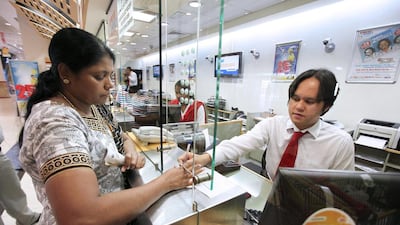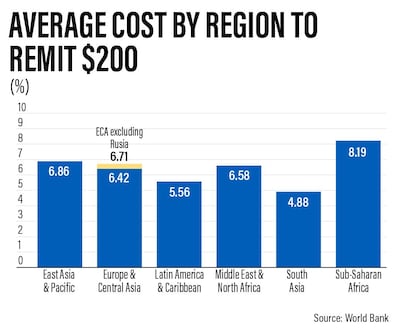Female expatriates in the UAE are more likely to remit a higher proportion of their salaries compared with men despite the gender wage gap, according to new data by the Foreign Exchange and Remittance Group (FERG).
On average, women remit between Dh1,500 and Dh2,000 per month to support their families and pay for education and healthcare, said FERG, which collected data from its member exchange and remittance companies.
“Women represented 25 per cent of remitters in the UAE in 2020,” the report added. “The data also revealed that remittances by Asian women in the UAE saw the most significant year-on-year growth, followed by Arab and African women, respectively.”
The report did not provide comparative figures for men.
Remittances are an important source of household income and foreign exchange inflows in developing countries, with women making up almost half of the 244 million people who live and work outside their country of birth, UN Women said in its 2020 Migrant Women & Remittances report.
“Importantly, this research found that while women typically earn less than men and pay more in transfer fees, the average remittance amounts they send are the same as or even greater than those of men,” UN Women said in the report.
Meanwhile, the top corridors with the highest remittances carried out by women in the UAE included the Philippines, India, Pakistan, Nepal, Sri Lanka, Indonesia, Egypt, Morocco and Uganda, the FERG report said.
“Female migrants make up approximately half of all the global migrant workforce and, therefore, their contribution to the global economy is of paramount importance,” Mohamed Al Ansari, chairman of FERG, said.
Al Fardan Exchange reported a 12.6 per cent increase in remittances by women in 2020 compared with the previous year, while Lulu Exchange said the number of women sending money home rose 2.63 per cent.
“Developing more financial products and services customised for women, aid in financial management and access to technology to avail online services is the need of the hour,” said Adeeb Ahamed, vice chairman of FERG said.
In October, the World Bank said global remittances would fall 14 per cent by 2021 compared with pre-Covid-19 levels in 2019. The Washington-based lender projected global remittances would decline 7 per cent to $508 billion in 2020 and 7.5 per cent to $470bn in 2021. This compares with the 2008 global financial crisis, when remittances fell about 5 per cent.























































































